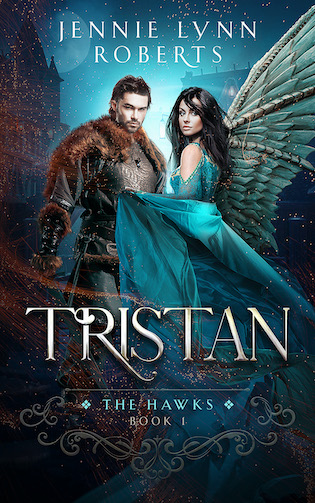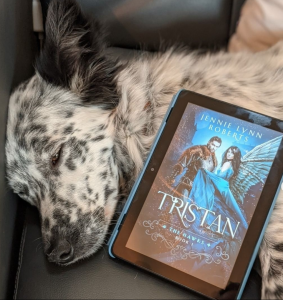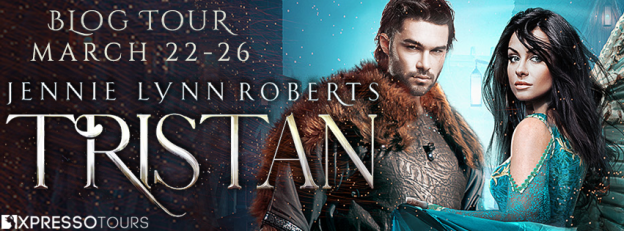Jennie Lynn Roberts‘ Tristan was promoed on Sadie’s Spotlight (a couple times actually). I didn’t agree to review it for the tour (so, I hope no one minds me borrowing the banner), but everyone who participated in the tour was given a complimentary copy. And since I think the cover is pretty darned awesome, I gave it a read. 
His redemption might be her downfall…
Tristan has nothing left to lose. His best friend’s betrayal cost him everything. Now, he’s going to take it back. All he has to do to get the Hawks reinstated to their rightful position at the palace is track down the traitor’s younger sister and turn her over for execution. But Nim’s not the girl Tristan left behind years ago; she’s a stubborn, loyal, beautiful woman, and he can’t stop himself from wanting her.
Nim fled with nothing when the king’s favorite came for her. All she has left is the conviction that her brother is innocent—and her determination to free him. She’ll do anything…even if it means convincing Tristan to help her. But the man he’s become is a far cry from the boy she fell in love with so long ago. He’s formidably stern and deeply untrusting. She’ll just have to hope he still has a heart under that battle-scarred exterior.
When love and duty collide, will Tristan follow his orders or follow his heart?

I generally enjoyed this. The writing is eminently readable, editing pretty clean, it has a gorgeous cover, and I liked the characters and the dynamic of the Hawks in general. I only really have one big complaint and a couple small ones.
My biggest complaint is the cliched use of rape to signal evil. I swear to the Goddess, I sometimes think authors have been told there is no other way to make someone truly evil, like this is required to be included or something. What’s more, it’s too often used as a proxy. Want the reader to know this character is evil, but don’t want to develop him? Just make him try and rape someone. No need for more; the reader will follow the signal. But, as a reader, I don’t want a proxy or a signal. I don’t want something to stand in for character development and tell me a character is evil. I want to understand that character and their evil.
Roberts is guilty of that here. She wanted the king, his chancellor, and the guards to be evil. So, she made them all open, sadistic rapists. (Though there is no on-page rape, thank goodness.) Sure, I understand that the king is supposed to have created an atmosphere that allowed others to do as he himself does, maybe even surrounded himself with like-minded men. But it was just ridiculous and angering as a female reader. I want better from authors, especially female authors. There are so many other, more subtle ways to make a character evil. Why keep bashing us with this blunt instrument?
My first smaller complaint is that the love is insta (at least for the reader). Which I find especially amusing because the author says, “This book is intended only for readers who love slow burn romance, fast-paced adventure, soul mates and found family…” I wholly disagree that this is a slow burn. I literally laughed out loud when I read that sentence. The soul mates part makes more sense. The romance is a lot more like shifters finding their mates. The beast knows, and all that. I’d call it a lot closer to insta-love than a slow burn. A LOT closer.
Lastly, the main characters kept trying to sacrifice themselves for each-other, for example, “She had to get out. Get to Grendal. Hand herself in. Save Tristan…” when it was very clear that the villains would kill both, not one or the other. They were clearly dealing with individuals who were not going to let one go if they had the other. So, the fact that both characters repeatedly overlooked this obvious fact and kept trying to trade themselves irritated me. As did the contrived misunderstanding about Keely, at the end.
But really, other than the rape thing (which is huge for me and probably, sadly, one of my most common criticisms in reviews, which tells you something about why it needs to be pointed out if it’s that problematically frequent in general), I have very little to criticize. I enjoyed Tristan and will happily read another Roberts book.

